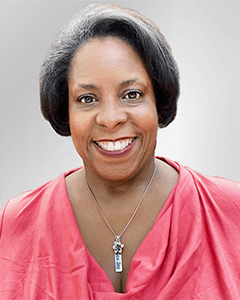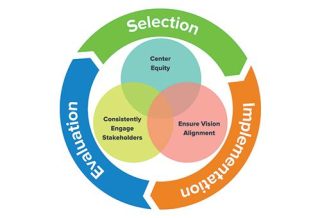NETWORKS AT WORK
Network advances curriculum-based professional learning
By Michelle Bowman
Categories: Improvement science/networks, Instructional materials/curriculumOctober 2023
The value and promise of teaching with high-quality instructional materials has been well-documented, but research suggests that good curricula can only do so much to advance student learning. High-quality curriculum-based professional learning is required to realize its potential (Chu et al., 2022). Diverse stakeholders must work together to produce improved professional learning that strengthens educational experiences and outcomes for students.
“...Research suggests that good curricula can only do so much to advance student learning. High-quality curriculum-based professional learning is required to realize its potential.” -Michelle Bowman #HQPL #StudentSuccess Click To TweetLearning Forward’s new Curriculum-Based Professional Learning network aims to do just that. The network provides member districts with an opportunity to work collaboratively with Learning Forward to advance the use of curriculum-based professional learning to implement and scale instructional practices that positively affect equitable student outcomes. This improvement network provides a research-informed structure to organize learning and address shared problems of practice in a collaborative environment fueled by rapid inquiry cycles to test ideas and document improvement.

The need for this network is underscored by the fact that the field of curriculum-based professional learning is promising but still emerging, with impact not yet consistently felt across the education ecosystem and a need for focused attention to resources, actors, and the evolving knowledge base (Chu et al., 2022).
The network is grounded in two premises. First, curriculum launch or implementation without tightly aligned professional learning can lead to content gaps from one grade to the next, lessons targeted at the wrong level, and ineffective differentiated support for students. Second, to effectively implement a high-quality instructional model with integrity, educators need a supportive, coherent professional learning system that is aligned with Standards for Professional Learning (Learning Forward, 2022). Alignment to the standards will ensure that professional learning is coherent, job-embedded, relevant to educators’ day-to-day work, and addresses critical issues affecting all students’ learning and achievement.
The network’s district partners for the 2023-24 school year include the School District of Philadelphia, Pennsylvania; Montgomery County Public Schools, Maryland; and Metro Nashville Public Schools, Tennessee. The member districts are all in early phases of implementing Illustrative Mathematics at the middle school level. Each member district will engage a core team of cross-role district- and school-based leaders from two to three middle schools reflecting the diversity of the district’s student population.
With funding from the Carnegie Corporation of New York, the network will meet throughout the school year for in-person and virtual convenings, virtual coaching sessions, and professional learning webinars. The teams will use Learning Forward’s well-established continuous improvement strategies and active learning grounded in Standards for Professional Learning. They will test evidence-based actions and collect immediate and practical data to inform decisions and catalyze the next iteration of a change. They will use change management tools and resources that help leaders create effective professional learning policies and in the service of improved teaching practices and changes in student learning and achievement. Resources such as The Elements: Transforming Teaching Through Curriculum-Based Professional Learning (Short & Hirsh, 2022), the network’s research and tools, and Learning Forward tools aligned to Standards for Professional Learning will undergird participants’ learning.
Districts in the network will:
- Share promising practices that support curriculum-based professional learning.
- Co-produce solutions regarding the implementation of high-quality instructional materials.
- Network with role-alike professionals and gain additional perspectives to support teacher teams and student outcomes.
- Gain additional perspectives on challenges and opportunities.
By working collaboratively, sharing knowledge, and engaging together in learning and problem-solving, they will make progress on a shared problem of practice to improve student learning in math through the combination of high-quality curriculum and high-quality teaching practices that are aligned to it.
References
Chu, E., McCarty, G., Gurny, M., & Madhani, M. (2022). Curriculum-based professional learning: The state of the field. Center for Public Research and Leadership, Columbia University.
Learning Forward (2022). Standards for Professional Learning. Author.
Short, J. & Hirsh, S. (2022). The elements: Transforming teaching through curriculum-based professional learning. Corwin.

Michelle A. Bowman is senior vice president of networks and continuous improvement at Learning Forward. She engages in and executes cross-organizational strategic thinking, especially through the strategy of networks and communities of practice, that supports state and local education agencies committed to professional development redesign. She also oversees the development of content and learning designs that support organizations' capacity to engage in continuous improvement processes. With 30 years in public education, Michelle served in leadership at the district, campus, and classroom levels before joining Learning Forward. Michelle has an Ed.D. in Learning and Organizational Change from Baylor University. Her dissertation investigated how school district leaders engaging in a community of practice impacts their professional learning efficacy. She also co-authored Teacher Professional Development in the Digital Age: Design and Implementation of Learning without Limits in Technology in the Classroom: How It Can Improve Teaching and Student Learning in American Schools (Rowman & Littlefield, 2017) with Learning Forward Executive Director (retired) Stephanie Hirsh. Michelle refreshes her soul, mind, and body by singing songs of worship and spending time with family and friends. She enjoys great coffee and long walks.
Categories: Improvement science/networks, Instructional materials/curriculum
Recent Issues
EVALUATING PROFESSIONAL LEARNING
February 2024
How do you know your professional learning is working? This issue digs...
TAKING THE NEXT STEP
December 2023
Professional learning can open up new roles and challenges and help...
REACHING ALL LEARNERS
October 2023
Both special education and general education teachers need support to help...
THE TIME DILEMMA
August 2023
Prioritizing professional learning time is an investment in educators and...











